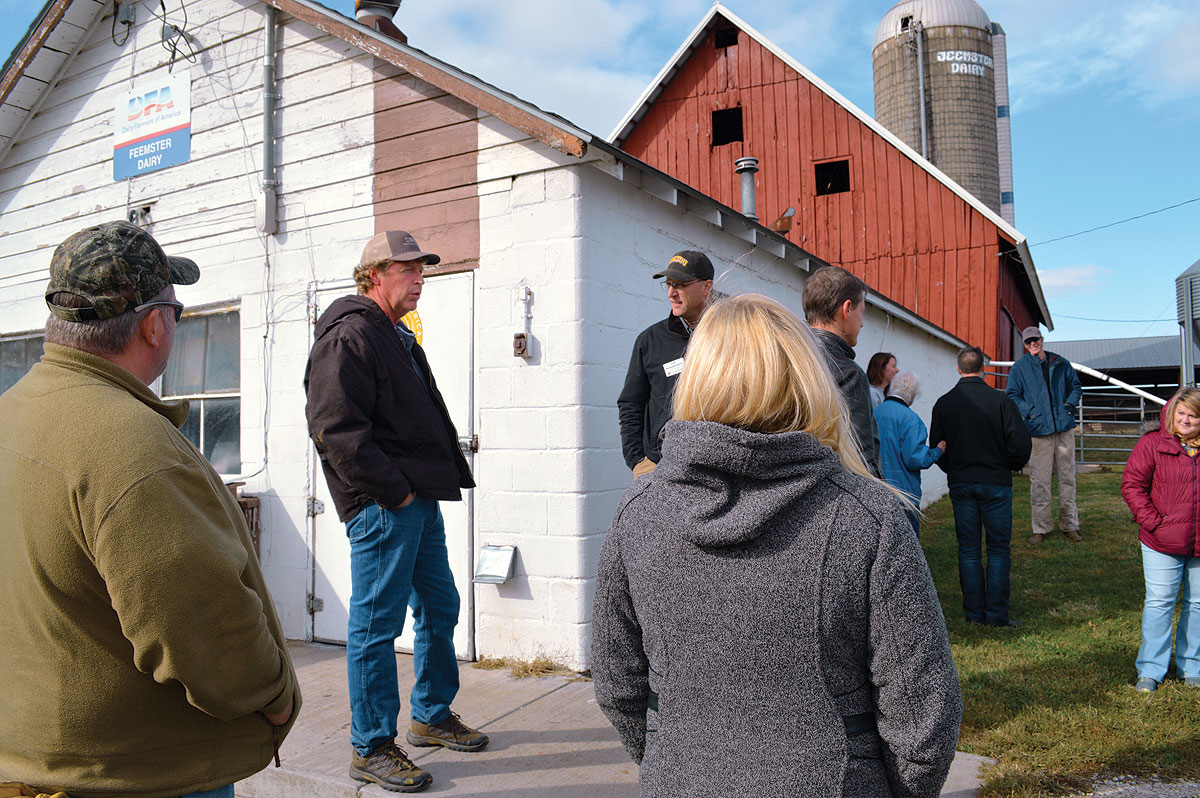
Farm tour gives county leaders a look at life on the farm
On a fall morning, the heavy, gray clouds hovered overhead and the sharp, damp wind cut chills straight to one’s core. It was on this dreary day around two dozen Greene County Mo., leaders boarded a bus for a tour of farms in the county.
David Burton with the University of Missouri Extension-Greene County office organized the educational excursion. As the farms tour began, Burton addressed the group with a reference to the bone-chilling cold.
“This is a good reminder that this is what farmers face every day,” Burton remarked.
The tour group included a mix of county government office holders, workers, commissioners and agencies. The University of Missouri Extension-Greene County office put together the tour to teach county leaders about the needs, challenges and successes of local farmers.
“We tried to pick spots that show snapshots of agriculture in the county,” Burton said.
The first stop of the day delivered the group to Greene County Commissioner Lincoln Hough’s farm in Fair Grove, Mo. Hough, along with his wife, Sarah, and young son, William, manage a couple hundred head of commercial momma cows on close to a thousand acres.
When Hough was in seventh grade, he borrowed $450 from his parents and purchased three cows. After raising and selling the calves from his first mini herd, he repaid his parents and then put a chunk of money in the bank.
“I thought I was the richest person in the world,” Hough recalled with a chuckle. “And I realized there is something to this.”
Hough emphasized his positive experience in working with the Greene County Soil and Water Conservation District. The agency partnered with Hough to implement a rotational grazing system for a portion of his farm.
The cost-share program allowed the Hough family to create a system that is better for their cattle operation and for the environment.
“This is a win-win for the landowner and the county,” Hough told the crowd. “As farmers we want to do the right thing and take care of our resources and environment. We are in this for the long haul.”
After leaving Hough’s farm, the tour headed to Rogersville, Mo., for a stop at Sunshine Valley Farm, owned and operated by Jan and Mike Wooten. The Wooten’s began growing specialty crops in 1989. The couple purchased 90 acres of rocky cattle pasture and transformed a portion of it into an orchard and berry farm.
For decades the Wooten’s have utilized the advice and technical assistance of horticulturists with the University of Missouri Extension, conservationists with the USDA’s Natural Resources Conservation Service, and experts with the Greene County Soil and Water Conservation District. “We got pointed in the right direction and got to take advantage of the opportunities and expertise of those agencies,” Jan Wooten said.
Sunshine Valley Farm chose to highlight its high tunnel built six years ago with a grant obtained with the assistance of the local NRCS office. The NRCS’ Environmental Quality Incentives Program (EQIP) has provided funding for more than 500 high tunnels in Missouri since 2010. The high tunnels are similar to a greenhouse. In a high tunnel, also called a hoop house, plants are grown in the ground instead of in pots on tables.
The Wooten’s high tunnel is 30 feet wide and 72 feet long with four-foot high walls and corrugated ends to give it more rigidity. After trying unsuccessfully for years to grow red raspberries, Wooten finally found success using the high tunnel. The high tunnel allows Wooten to regulate (as much as possible) weather conditions for her plants.
The next stop of the Greene County Commission Agriculture Tour showcased the use of high tunnels as well. Members of the tour received an up close look at Ozarks Food Harvest’s community garden located on the farm of Drs. Alan and Meera Scarrow in Rogersville, Mo.
The extensive garden includes two high tunnels, raised vegetable beds and small row plantings. This year the garden produced 10,000 pounds of vegetables and fruit to help people in need. Volunteers harvest the fresh produce and donate it to senior centers, a domestic violence shelter, and north Springfield, Mo., neighborhoods. “We have volunteers out here every week. We have to have volunteers to make it work,” Alexa Poindexter, Full Circle Gardens Coordinator, said.
Ozarks Food Harvest operates another program that asks area farmers and gardeners to plant additional fruits and vegetables to give to people in need. “We are growing, we are partnering, and we are encouraging others to grow,” Poindexter said.
The last farm on the tour took participants just north of Springfield, Mo., to a long-standing dairy operation. Jordan Feemster and his family run one of the last dairy farms in Greene County. “I believe milking is an inherited sanity,” Jordan Feemster said with a laugh.
The large dairy farm milks more than a hundred Holstein cows a day. The Feemster family grows and bales its own alfalfa hay. Feemster Dairy has partnered with county agencies through the years to assist it with waste and drainage issues and to implement a rotational grazing operation.
Feemster Dairy grows corn and soybeans using a no-till system. “We haven’t put a till in the ground for 22 years,” Feemster said. The no-till crop operation helps the Feemster family manage their land that is prone to erosion. “My dad always said, ‘The dirt belongs on the ground, not in the pond,’’ Feemster commented.






